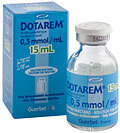by
Carol Ko, Staff Writer | July 31, 2013
Last week, Cincinnati Children's Hospital Medical Center performed the first U.S. injection of Dotarem, the only macrocyclic, ionic gadolinium-based contrast agent approved by the U.S. Food and Drug Administration.
The contrast agent, approved by the FDA in March this year, is intended for use with magnetic resonance imaging (MRI) in adult and pediatric patients two years of age or older.
It is currently one of only two contrast agents (the other being Magnevist) available on the U.S. market approved specifically for pediatric patients ages 2-18.



Ad Statistics
Times Displayed: 46715
Times Visited: 1411 MIT labs, experts in Multi-Vendor component level repair of: MRI Coils, RF amplifiers, Gradient Amplifiers Contrast Media Injectors. System repairs, sub-assembly repairs, component level repairs, refurbish/calibrate. info@mitlabsusa.com/+1 (305) 470-8013
Dotarem has been widely available in non-U.S. markets since 1989 and is the preferred contrast agent in Europe due to its established history of safety and effectiveness.
In gadolinium-based contrast agents, the element gadolinium, which is toxic to humans when freely circulating, is bound to other atoms in a chemical compound to minimize release of free gadolinium into the bloodstream. But even so, small amounts of free gadolinium may break off from the chemical compounds and escape into the body.
This poses a risk for patients with poor kidney function, since the gadolinium-based contrast agents have been associated with nephrogenic systemic fibrosis, a rare but serious condition.
However, new macrocyclic agents such as Dotarem reduce the risk of gadolinium breaking free into the body.
"Macrocyclic agents are like a cage," explained Dr. Daniel Podberesky, chief of thoracoabdominal imaging in the Department of Radiology, Cincinnati Children's Hospital Medical Center. "The way the gadolinium is bound in the molecule, it significantly decreases the possibility of the gadolinium breaking away and circulating freely in the body where it can cause harm."
In addition, Dotarem is also an ionic molecule, which means the binding of the gadolinium to the molecular structure is much stronger than in non-ionic agents. "The chances of free gadolinium breaking off are much smaller compared with other contrast agents on the market in the U.S.," said Podberesky.
The entrance of this new contrast agent to the U.S. market opens up options for patients who would otherwise have few alternatives — particularly susceptible pediatric patients. "We are always very cautious giving gadolinium agents to any child with even mild renal dysfunction. Now we have an alternative in this population," Podberesky says.

